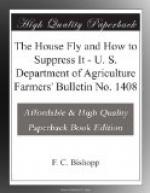In deciding the question as to how often manure should be removed in cities and towns, it should be borne in mind that when the larvae have finished feeding they will often leave the manure and pupate in the ground below or crawl some distance away to pupate in debris under boards or stones and the like. Hence the manure should be removed before the larvae reach the migratory stage; that is to say, removal is necessary every three days, and certainly not less frequently than twice a week during the summer months. A series of orders issued in 1906 by the health department of the District of Columbia, on the authority of the Commissioners of the District, covers most of these points, and these orders, which may well serve as a model to other communities desiring to undertake similar measures, may be briefly condensed as follows:
HEALTH OFFICE REGULATIONS FOR CONTROL OF HOUSE FLIES IN CITIES.
All stalls in which animals are kept shall have the surface of the ground covered with a water-tight floor. Every person occupying a building where domestic animals are kept shall maintain in connection therewith a bin or pit for the reception of manure and, pending the removal from the premises of the manure from the animal or animals, shall place such manure in said bin or pit. This bin shall be so constructed as to exclude rain water and shall in all other respects be water-tight, except as it may be connected with the public sewer. It shall be provided with a suitable cover and constructed so as to prevent the ingress and egress of flies. No person owning a stable shall keep any manure or permit any manure to be kept in or upon any portion of the premises other than the bin or pit described, nor shall he allow any such bin or pit to be overfilled or needlessly uncovered. Horse manure may be kept tightly rammed into well-covered barrels for the purpose of removal in such barrels. Every person keeping manure in the more densely populated parts of the District shall cause all such manure to be removed from the premises at least twice every week between June 1 and October 31, and at least once every week between November 1 and May 31 of the following year. No person shall remove or transport any manure over any public highway in any of the more densely populated parts of the District except in a tight vehicle, which, if not inclosed, must be effectually covered with canvas, so as to prevent the manure from being dropped. No person shall deposit manure removed from the bins or pits within any of the more densely populated parts of the District without a permit from the health officer. Any person violating any of the provisions shall, upon conviction thereof, be punished by a fine of not more than $40 for each offense.
Not only must horse stables be cared for, but chicken yards, piggeries, and garbage receptacles as well. In cities, with better methods of disposal of garbage and with the lessening of the number of horses and horse stables consequent upon electric street railways, bicycles, and automobiles, the time may come, and before very long, when window screens may be discarded.




